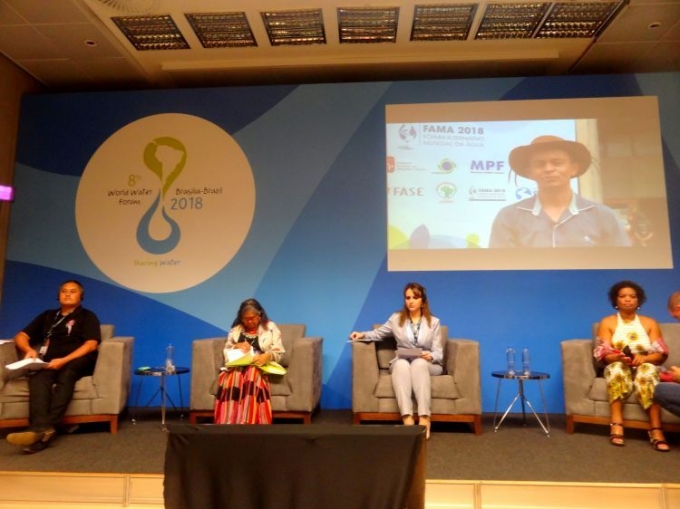"The Nagorno-Karabakh conflict between Armenia and Azerbaijan has lasted for more than 25 years and lead to appearance of 1.2 refugees and IDPs in Azerbaijan. Armenian armed forces occupied 20 % of Azerbaijani lands, including the territory of Nagorno-Karabakh and seven surrounding regions. The impact of military operations on environment in the frontline regions is very destructive. Excessive exploitation of natural resources on the occupied territory, constant shelling and ignorance the fact of environmental collapse by Armenia destroy ecology and violate the right of thousands to live in appropriate conditions".
It was stated by assistant to the President of the International Eurasia Press Fund (IEPF) Anastasia Lavrina during the 8th World Water Forum , which is taking place in Brazil from 17 to 23 March. This is the world’s biggest water-related event organized by the World Water Council (WWC) with participation of more than ten thousand participants from 160 countries.
In her speech at the session titled ‘Liability, justice and compensation for environmental crimes and rights violation’, she talked about the negative influence of military conflict of environment. She also touched the point about the occupation of the largest water reservoir Sarsang by the Armenian armed forces.
"Sarsang water reservoir has been occupied by Armenia since 1992 and as a result, the frontline regions of Azerbaijan have been deprived of its water. Due to the lack of water and also because of constant shelling, the largest area of lands in the frontline regions is not irrigated. It leads to appearance of cracks and destruction of fertile layer. Six regions of Azerbaijan can no longer use water from the reservoir, which is currently in an emergency situation, because it has not been maintained due to the occupation. Engineers and scientists predict that if the dam breaks down, more than 30 villages would be ruined by flood. The risk of a disaster is currently very high and the lives of 400,000 Azerbaijani citizens who live in the six regions downstream are in danger", Anastasia Lavrina said.
She also referred to the factor of pollution and poisoning of water by Armenians. Moreover, Lavrina talked about the exploitation of the natural resources on the occupied territories by the Armenian government and further use it for own benefit.
"The richest minerals in Azerbaijan remained in the occupied territories. There are 155 deposits of various types of minerals in the occupied territories, including 5 gold deposits, which are currently used by Armenia."
Anastasia Lavrina also referred to the PACE resolution from 2016, which points at Armenian authorities abusing the water of the Sarsang basin.
She mentioned that it is a hostile act aiming at creating environmental disaster for the citizens of Azerbaijan. By such behavior, Armenia violates not only the principles of territorial integrity of another state but also a number of conventions and resolutions, which prohibit the destruction of movable and immovable property of the occupied start. Moreover, as a part of the UNEP program, Armenia’s current policy contradicts with the UN environmental standards.
"International institutions try to raise the awareness about growing ecological threat among states in order to have coordinative work in risk reduction; however, in major cases, economic and political perspectives have more influence over ecology and environment."
Anastasia Lavrina pointed out that there should be more international attention paid to the fact of Armenian ecological crime in the occupied territories of Azerbaijan. Resolutions become ineffective in the case if there is no proper action taken immediately after ratification. Immediately when the resolution is adopted, states have to be pressed to follow the rules without wasting the time, otherwise the level of public pressure start to decrease and countries get freedom in their activity again, as it is happening in the case with Armenia’.
IEPF President Assistant called the representatives of the international institutions, civil society representatives and Forum’s participants to stand together, unite the efforts and respond to the environmental crisis provoked by the military crisis in different parts of the world.
"Water is a life and it cannot be used as a weapon in the hands of occupants. Unfortunately, Armenia violates all the norms and rules and use the Sarsang water reservoir as a weapon against people, against humanity. It has to be stopped. People should know about this problem and international institutions have to press Armenia to liberate the reservoir. In 2007, Robyn Eckersley suggested that one serious environment emergency should be enough to overcome the norm of sovereignty and allow intervention of global environmental community in the domestic policy of the state. Maybe this is exact a case for this activity" – she added in the end.
During the panel discussion, the participants were demonstrated the video prepared by the IEPF, which talks about the water problems in the front-line regions of Azerbaijan connected with the ecological disaster in the Sarsang reservoir, which is under the control of the Armenian armed forces.


